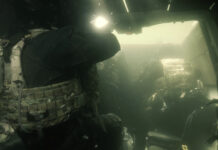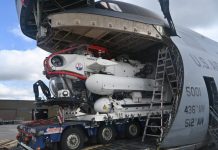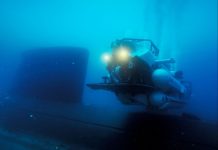UK underwater operations specialist JFD is looking to extend its market recognition among the special operations forces (SOF) community, especially with its range of tactical diving vehicles (TDVs), with attendance at the SOF Week event in downtown Tampa, Florida, from 6-10 May 2024.
JFD will be taking both its Carrier Seal and Shadow Seal TDVs to the SOF Week event, but will additionally be demonstrating the Carrier Seal in waters close to the SOF Week location in Tampa after the event closes. The Shadow Seal, meanwhile, was first exhibited at the SOF Week event in May 2023.
Speaking to ESD on 16 April 2024, Alistair Wilson, JFD’s strategy, sales and marketing director, also noted that the company is in the final stages of onboarding the Carrier Seal TDV with the US Department of Defense’s Foreign Comparative Testing (FCT) programme, which is designed to test platforms and technologies of US allies that have a high technology readiness level with a view to rapidly and economically address US defence requirements.
“We bid [for FCT] in December,” said Wilson, “and by the end of this month they’ve got to kind of finalise their position.”
The company established JFD North America, based in Reston, Virginia, in March 2021 to bring its portfolio to the US defence market and in October 2023 appointed Keith Lehnhardt as its general manager in the United States. Lehnhardt has a 35-year career with the US Navy behind him that includes the kind of experience, with diving units and on submarine operations, that covers the spectrum of JFD’s portfolio.
Meanwhile, in March 2022 JFD signed a strategic partnership with Fort Lauderdale-based Blue Tide Marine (BTM), which acquired a JFD Shadow Seal four-man TDV through a leasing arrangement in 2023. BTM’s business model revolves around selling capability development training, while JFD would essentially be the platform provider for any TDV-related business that BTM picks up. The BTM relationship thus raises the profile of JFD’s Shadow Seal TDV, with Wilson noting that “the Blue Tide Marine folks have got exposure to all the right people”.
Explaining one of the key selling points of its TDVs, beyond their ability to approach a hostile shore submerged and undetected, Wilson explained that, while minisubs like the Shallow Water Combat Submersible (SWCS) used by US Special Operations Command (USSOCOM) require a high-value submarine to approach a hostile coast for them to be deployed, JFD’s TDVs can be deployed from a significant stand-off range. The eight-man Carrier Seal, for example, has a typical surface range of 150 n miles (278 km) in addition to its 14 n mile subsurface range, but Wilson noted that, by carrying extra fuel bags in place of two personnel, its range can be extended out to 225 n miles.
JFD TDVs can also be transported innocuously in standard ISO containers and deployed from any marine vessel that has the equipment to launch them.
JFD is also looking into the possibility of its TDVs being operated autonomously. Wilson noted that the company has already remotely operated a Shadow Seal and has a roadmap for autonomous operations with the Carrier Seal. He explained a concept whereby a marine commando raiding party, once deployed using TDVs, could then be resupplied by autonomous/remotely operated TDVs.
Wilson additionally mentioned that the company’s TDVs could quite easily be converted to carry a range of different payloads beyond combat swimmers, such as various sensors or other effectors.
In terms of TDV sales opportunities, Wilson noted that there are two Carrier Seals in service – one in Europe and one in Asia – with interest in its TDVs currently coming from Greece, Sweden, Japan and the Indo-Pacific region in general. A particular potential opportunity is with South Korea, which is developing a requirement for a ‘Special Assault Boat’. This concept involves five ‘motherships’ each carrying four Carrier Seal-type TDVs, giving a requirement for 20 such vessels.
“We expect to that to be ratified as a programme by the end of this year,” said Wilson.
Regarding JFD’s prospects for selling its TDVs, Wilson remarked, “We’re nearly there; I’d be really surprised if we don’t break good ground within the next 12 months.”
Looking beyond TDVs, JFD is also examining potential opportunities within the trilateral Australian-UK-US (AUKUS) strategic partnership, under which the UK Royal Navy (RN) and Royal Australian Navy (RAN) will operate a future fleet of SSN-AUKUS nuclear-powered attack submarines. JFD is looking in particular at opportunities under Pillar 2 of the AUKUS partnership, which includes among other things the development of advanced undersea capabilities. As a world leader in the provision of submarine rescue services, JFD is already the incumbent supplier of such services for the RN and RAN, so is well positioned to provide a future solution for the SSN-AUKUS boats as well as other advanced underwater warfare capabilities.
Among its other products and services, JFD continues to pursue further opportunities with its range of military diving equipment.
JFD is currently pitching a variant of its Stealth Rebreather to address the US Naval Sea Systems Command’s Multi-Mission Underwater Breathing Apparatus (MMUBA) requirement to replace the Mk 16 system with a closed-circuit, mixed-gas diving system for a variety of military diving operations in both deep and shallow water. This contract is for 675 rebreathers, which Wilson noted is “as many rebreathers as we’ve sold in 20 years of that type”.










